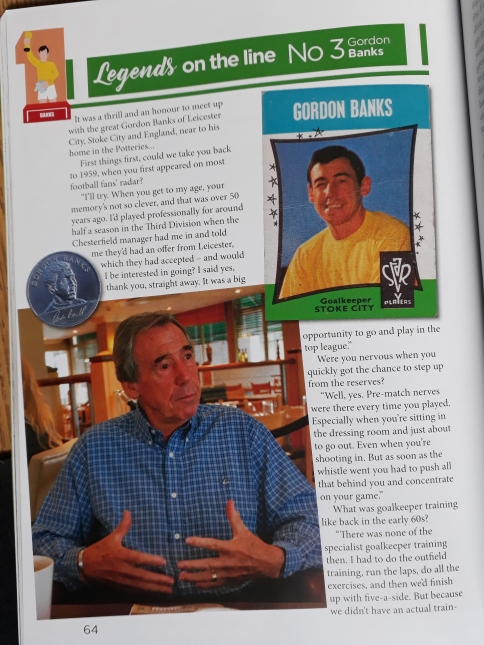It was a thrill and an honour to meet up with the great Gordon Banks of Leicester City and England, near to his home in Stoke. Here are exclusive extracts from a generous, modest and inspirational interview that provided some of the finest moments in both Glove Story and Can’t Buy That Feeling.
First things first, could we take you back to 1959, when you first appeared on most football fans’ radar?
“I’ll try. When you get to my age, your memory’s not so clever, and that was over 50 years ago. I’d played professionally for around half a season in the Third Division when the Chesterfield manager had me in and told me they’d had an offer from Leicester, which they had accepted – and would I be interested in going? I said yes, thank you, straight away. It was a big opportunity to go and play in the top league.”

Were you nervous when you quickly got the chance to step up from the reserves?
“Well, yes. Pre-match nerves were there every time you played. Especially when you’re sitting in the dressing room and just about to go out. Even when you’re shooting in. But as soon as the whistle went you had to push all that behind you and concentrate on your game.”
What was goalkeeper training like back in the early 60s?
“There was none of the specialist goalkeeper training then. I had to do the outfield training, Run the laps, do all the exercises, and then we’d finish up with five-a-side. But because we didn’t have an actual training ground then, we had to play on the Filbert Street car park. I couldn’t dive about on that surface so I didn’t go in goal, I played outfield. A few years later, when they got the training ground, that gave me the opportunity to go back in the afternoon. The lads finished training at lunchtime, so I had to get some of the apprentices and reserves to come back in the afternoon and bang some balls at me.”
Goalkeeping experts always talk about your positional sense. Was that something that came naturally to you, or did you have to work on it?
“You have to work on it to get it to the highest level. Those long afternoons helped me quite a lot. But just as important was all those many hours spent playing as a boy, maybe playing with a tiny ball or whatever. Even if you were playing against an old shed, you’d still be learning where to stand in a given situation. You didn’t realise at the time you were learning about angles.”

After two FA Cup finals and winning the League Cup with City, you got your first England call-up.
“I was down at the ground when I found out about it. Matt Gillies, the manager, came into our snooker room, shook me by the hand and said, ‘Congratulations, you’re in the England team.’ I couldn’t quite believe it as the squad hadn’t even assembled yet. Obviously, Alf must have said something to him. It as a something of a shock and a great delight. I remember feeling very, very proud.”
Your international debut was against Scotland at Wembley. A nice easy one to start with?
“Oh crikey, not half! Every single time we played Scotland over the years, no matter whether at Wembley or Hampden, it was a really tough game. About 90 per cent of the Scots played in the English First Division so they were always a match for us. We lost 2-1. They got a penalty past me, and I was feeling quite down, but Alf Ramsey came up to me and said, ‘Well played.” That gave me a bit of a lift and I was pleased that he’d seen something in my game.”
Do you still get asked about 1966 every day of your life?
“What can you say that would describe how it feels to win the World Cup? It was a fantastic feeling. I knew I had lots of years left in the game, as I’d trained well and worked hard, so at the time I didn’t see it as the pinnacle of my career. I thought that both England and Leicester City would push on from there and get better. Both were good set-ups with players coming to the best part of their careers. I thought really that was just the beginning.”
But that season after the World Cup was your last at Leicester.
“I’d seen Peter Shilton occasionally while he was playing for Leicester City Boys and then he got in the England Schoolboys side. I saw him in the gym – two mats down, with trainer George Dewis banging balls at him. I watched him for five minutes and I thought, bloody hell, this lad has got some real technique here!” When he signed as an apprentice, he’d join in on the little goalkeeping sessions that I organised.”
How did you feel when you were transfer-listed?
“I was shocked and amazed. I couldn’t believe that they’d want to get rid of me. I’d seen this report in the paper where Peter was supposed to have said to the board: “I either want first-team football, or I want to leave.” When I saw that, I laughed. I thought, I’ve played for England and won a World Cup. Does he honestly think they’re going to drop me and put him in? A couple of weeks later, Matt Gillies came to the training ground, which he never, ever did. We were running around the track, warming up. Before he even said a word, I knew exactly what was going to happen. He told me: ‘The board have had a meeting. What would you think about leaving?’ Straight away, I knew it was done, so I replied: “Well, if that’s all you think about me then I’ll go. It really shook me up – children, friends, social scene – we were really settled.”

What were your options at that time?
“I’d heard rumours that Liverpool wanted me. Roger Hunt said don’t sign for anyone because Bill Shankly is going to come in for you. Many years later, he did tell me that he went to his board but they refused him the money. Martin Peters told me that West Ham wanted me, but they signed Bobby Ferguson from Kilmarnock for £57,000 three weeks before I was put on the list. That was a lot of money. Stoke paid £50,000 for me.”
Do you think you’d enjoy playing in the modern game?
“If you’re talking about the work a goalkeeper has to do now, then no. If you’re talking about the money, then yes! They’ve made it very difficult for goalkeepers now, with the light ball and people standing purposefully in front of the keeper at a corner. It’s pure obstruction.”
Do you have any regrets? Is there anything you wish you’d done differently?
“I wish I’d been a better driver! Although my career was cut short by my accident in 1972, I did go on to have a good few more years in the game, coaching at Stoke and playing in the NASL. No, to have a life in professional football was fabulous. Playing in front of thousands of people, enjoying every minute, and travelling all over the world into the bargain. Wearing the England shirt with that badge on it and standing there singing the National Anthem, I can’t possibly have any regrets.”
Glove Story: The Number 1 Book for Every Goalkeeper, Past and Present, and Can’t Buy That Feeling: Inside Leicester City – The Best of the Fox Interviews are available from ConkerEditions.co.uk

